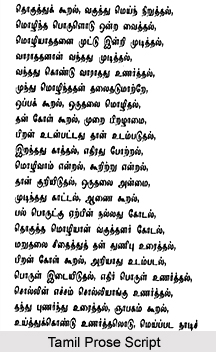 Prose in Tamil Literature occupies a significant place in the history of Tamil literature as with the gradual development of literacy rate in Tamil Nadu, Tamil prose started to evolve and flourish. With the evolution in the style of Tamil prose, the gradual changes in Tamil language can also be discovered. In the ancient history of Tamil literature, prose was written similar to the Akaval form with assonance and alliteration. Subsequently the use of this form was reduced, although the syntactical form with subject and predicate was preserved. This type of Tamil Prose was not based on the spoken Tamil language. In actuality, the initial poetical style resembled the spoken Tamil to much extent, instead of the written form. The written prose style was mainly concise, short and brief and even depicted the subtleness and complications of thought.
Prose in Tamil Literature occupies a significant place in the history of Tamil literature as with the gradual development of literacy rate in Tamil Nadu, Tamil prose started to evolve and flourish. With the evolution in the style of Tamil prose, the gradual changes in Tamil language can also be discovered. In the ancient history of Tamil literature, prose was written similar to the Akaval form with assonance and alliteration. Subsequently the use of this form was reduced, although the syntactical form with subject and predicate was preserved. This type of Tamil Prose was not based on the spoken Tamil language. In actuality, the initial poetical style resembled the spoken Tamil to much extent, instead of the written form. The written prose style was mainly concise, short and brief and even depicted the subtleness and complications of thought.
Early prose in Tamil literature was basically constructed with the aim of serving to scholars; hence it comprised several unique words which were mostly unknown in the common Tamil language. But with the emergence of technology and printing machines, it was eventually realized that Tamil prose could be utilised as a potential medium and could be used by everyone. Therefore, Tamil prose was simplified and the use of unique and rare words was minimised. The syntax in Tamil prose became much closer to the spoken Tamil language.
During the last century, with the development of publication, daily and weekly newspapers, magazines and journals became popular and thus Tamil prose accomplished articulacy, simplicity and fluency. The syntax of prose resembled the vernacular language. As short stories and novels developed as accepted genres and was read and appreciated by the general population, fluency, simplicity and clarity formed an intrinsic part of the literary style. As a result, a new form of Tamil prose evolved which was able giving form to depict various types of thoughts and human emotions with the utilistation of only known and simple words.
In Tamil poetry, with the introduction of new forms of versification, the earlier forms were not completely rejected. Till date several poets compose poems by using only traditional verse forms. Similarly, regardless of the development of simple prose forms, several scholars and writers prefer using the traditional styles pregnant with antiquated words, alliterations and assonances.



















